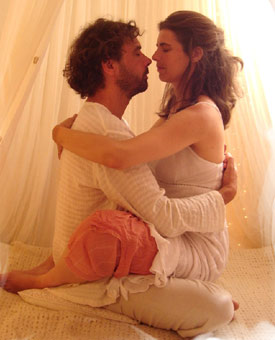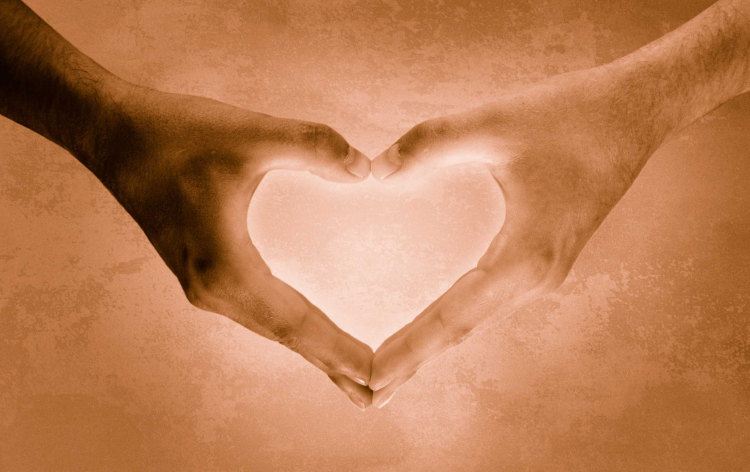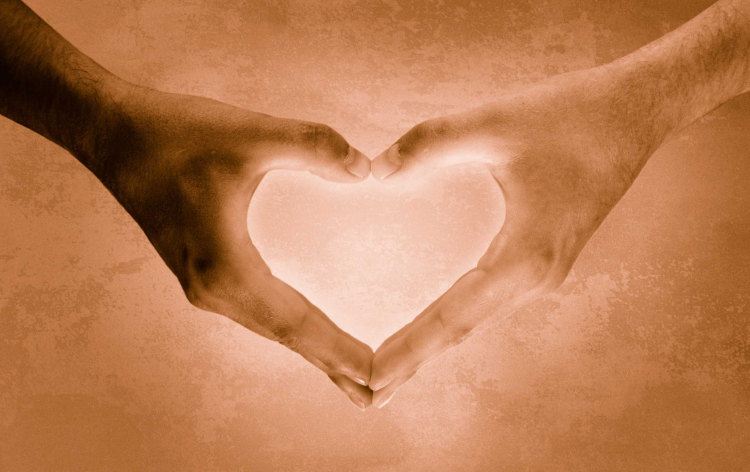Intimate Relationships
What About Sex?
>Sexual connection in intimate relationship is another vital aspect of a healthy loving relationship. But the topic of sex in relationship is far bigger than just sex. The quality, frequency and integrity of sex reflect the broader dynamic in the relationship. Ultimately everyone in intimate relationship wants to feel connected to the one they love. They want to feel the love inside their own heart for their partner, and they want to feel loved by their partner. No matter what women and men say about one another, closeness and love is what we are looking for.
It is not unusual to hear women say, “he just wants sex!” Likewise, men might say “all she wants to do is talk!” But what is important here is that both parties actually want the same thing… love! They just have different ways of giving and receiving love. In an intimate relationship where a man does actually care about the woman he is with, he is likely to want sex. Generally speaking, men seek closeness and intimacy through physical sexual contact. There can be other issues happening for a man that get in the way of wanting sex in a relationship, this is also not uncommon. But those issues would need to be addressed by him and possibly in therapy.
Women, on the other hand, often seek closeness and connection through verbal communication. They generally need to feel close and connected to the man before they are ready for sex. So you can see how this dynamic plays out in relationships.
Unconscious Sex in Relationship
I went to a fantastic talk last night presented by Janet McGeever and Gene Thompson on conscious lovemaking. Their overview of traditional sex and conscious lovemaking was very enlightening and it neatly fits with what I have said above.
In their seminar they stated that traditional sex is about expectation, tension, the goal of orgasm, and intercourse. The man has a job to do… to get his woman to orgasm before he can, while maintaining an erection. The woman often feels disconnected because he is not present with her, rather he is concentrating on his “task” to perform. She may even fake orgasm for a range of different reasons. She may feel his pressure and be trying to help him overcome it by allowing him to ejaculate, thinking he has done his job well. Or if the broader context of the relationship is compromised, she may just want it over and done with so she can sleep. A great point Janet and Gene made was that a lot of women have an expectation of themselves that they have to serve their man by being sexually available for him. This can recruit her into having sex without wanting to or being ready to, which ends up having a huge closing down effect on her emotionally and physically.
So the man expects himself to perform his job and she expects that she has to serve him sexually. Neither party ends up enjoying it in the long term. So while sex may be great at the beginning, it becomes mundane and a chore as the relationship matures.
Conscious Lovemaking
 Janet and Gene then went on to describe conscious lovemaking. They stated in their seminar that in contrast to traditional sex in a relationship, conscious lovemaking is relaxed, not goal orientated, has no expectations of self or other, and is far broader than just intercourse. Janet spoke about the woman’s experience in sex where the positive polarity with a man is in the breast and heart area, while the man’s positive polarity in the genitals. This positive and negative polarity has to happen to for the sexual and love attraction to happen between a man and a woman. She starts to warm up in the heart and breasts, he starts to warm up in the penis. If all goes well, the energy will move down her body to her genitals and for him, it will move up to his heart.
Janet and Gene then went on to describe conscious lovemaking. They stated in their seminar that in contrast to traditional sex in a relationship, conscious lovemaking is relaxed, not goal orientated, has no expectations of self or other, and is far broader than just intercourse. Janet spoke about the woman’s experience in sex where the positive polarity with a man is in the breast and heart area, while the man’s positive polarity in the genitals. This positive and negative polarity has to happen to for the sexual and love attraction to happen between a man and a woman. She starts to warm up in the heart and breasts, he starts to warm up in the penis. If all goes well, the energy will move down her body to her genitals and for him, it will move up to his heart.
After hearing about this last night, I realised how much that explanation fits perfectly with what I already knew about sex in relationships. For the sexual and love polarity to work between a man and a woman it is vital that she moves from the heart/emotional down to the physical, and that he moves from the physical to the heart/emotional.
The important trick in conscious relationship is to honour yourself and your partner by understanding the different movements of sexual/emotional energies in men and women, and respecting and embracing those differences. Working with this natural lore, rather than forcing our own will on how we think it should be done … men think sex/women think conversation or non-sexual affection… is the key to great on-going sex in the long term and a healthy, connected loving intimate relationship.
For more information about Janet and Gene’s Conscious Love Making Retreats click here!
Communication Strategies in Conscious Relationship
In my last blog, “Misunderstanding Communication Styles Between Gender”, I spoke about how different styles of communication between men and women create misunderstanding and conflict in intimate relationships. Today I want to focus on strategies that both genders can adopt to enhance communication within their relationship.
An Open Mindset: Assume Nothing!
The first strategy is to develop an open mind set to yourself and your partner. We often assume and take for granted that other people know what we are trying not communicate. In couples counselling I have become all too aware how this is simply often not the case, and especially in the context of intimate relationship. Perhaps that is why so much blame is often thrown around in relationships. People are trying to communicate information that is dear to their hearts, and the other person seems to attack them for it. Often that person is not intending to attack their partner (unless they are already hurt and are trying to hurt them). Rather they are often just trying to communicate and be understood with no avail! Generally people do not go into relationships to hurt and hate the person they say they love. Conflict in intimate relationships is usually the result of a whole lot of misunderstanding.
As for the person who is aiming to hurt their partner, that strategy never works. A rule of thumb in intimate relationships is “if one person wins an argument, they both lose!”
So keeping an open mind, not only about the content of what your partner is saying, but also the process of how they are saying it, can help cultivate a shared understanding between both members of the couple.
Mindfulness Practice: Cultivating Self Awareness
The second strategy is mindfulness practice. We can open our mind about what and how our partner is communicating, but we also have to watch our own style of communication. We often do not reflect on or take notice of how we are communicating or what we are actually saying. Often we are so busy in the midst of unconsciously reacting in intimate relationship, that we simply do not practice the awareness required to successfully navigate through the minefield of relationship. However, intimate relationship does not have to be a minefield! Through mindfulness we can learn to witness thoughts, feelings and actions that arise in response to our partners. We can do this for both pleasant and unpleasant emotional reactions. So mindfulness is an important ingredient to conscious relationships, by helping people to break free from their unconscious reactive patterns. [Feel free to subscribe to my 10 days of Mindfulness Tips & Audio Mediations … it is a free subscription]
 One thing I love about Taoist philosophy is that they promote intimate relationship as a conscious daily practice. It is amazing that in the West couples can ‘stay together’ for decades and know nothing about cultivating conscious practice in intimate relationship. It is no surprise that they end up in psychotherapy when the children leave home. They have been existing together in the same geographical location however, they were not really participating in intimate relationship. They may not have even had an interesting conversation with each each other for fifteen years. So cultivating mindfulness practice in conscious relationship can help enhance the connection between both members of the couple.
One thing I love about Taoist philosophy is that they promote intimate relationship as a conscious daily practice. It is amazing that in the West couples can ‘stay together’ for decades and know nothing about cultivating conscious practice in intimate relationship. It is no surprise that they end up in psychotherapy when the children leave home. They have been existing together in the same geographical location however, they were not really participating in intimate relationship. They may not have even had an interesting conversation with each each other for fifteen years. So cultivating mindfulness practice in conscious relationship can help enhance the connection between both members of the couple.
Honour Ourselves and Each Other
Besides understanding different styles of communication and cultivating conscious awareness of self through mindfulness practice, the third important strategy underlying communication in intimate relationship is to consciously set the intention behind the communication. Good will between both partners is essential to effective communication in conscious relationship. We could call it ‘goals’ or ‘agenda’ but I call it intention because it embraces feeling into the conscious and unconscious currents underneath the communication.
Setting an intention involves really checking out our own intent behind our communication. For example, I might actually say, “you never listen to me” or “why do you always push the point?” But what am I really trying to say? Your partner may hear blame or criticism when what you may really want to say is… “I feel really hurt and frustrated because I don’t feel understood. What is happening between us in our communication that we mis-understand each other so much?”
Honouring ourselves and each other is about checking out our intention with compassion and understanding for our patterns. It is about giving ourselves and our partner the respect to listen deeply rather than react out of our emotional pain. It is about regularly carving time out of the day to pay attention to, and cultivate, real connection with our partners. It is also about knowing ourselves, and standing in our truth solidly with compassion for self and other. It is about self-value and honest communication, while considering our partners perspective.
So here are those strategies again:
Conscious intimate relationship is all about co-creating connection in love. It involves regular practice which is as important as maintaining your physical health, parenting your children or paying your bills. These strategies in communication are the cornerstone of creating conscious relationship. Learning and adopting them as everyday habits could enhance the quality of your relationship.
In what ways could these strategies help enhance your relationship?
Misunderstanding Communication Styles Between the Genders
In couples counselling, it is amazing how often I hear a woman in an intimate relationship with a man say “he just needs to communicate with me!” And then I hear man say in frustration, “but I do communicate with you. What more do you want?” Both parties look deflated from this on-going unresolved argument that leaves them both confused, increasingly frustrated and hurt. After listening to this common conflict in so many couple relationships I realised there is a lot more going on than meets the eye!
Verbal Communication Differences
 The word “communication” actually means something very different to most men and women. Let’s start with verbal communication! The actual reason or purpose behind verbal communication is also different between the genders. Generally men will verbally communicate to address a problem or fix an issue. It is a tool for getting something done.
The word “communication” actually means something very different to most men and women. Let’s start with verbal communication! The actual reason or purpose behind verbal communication is also different between the genders. Generally men will verbally communicate to address a problem or fix an issue. It is a tool for getting something done.
Verbal communication for women, on the other hand, is often to connect with the other person and share how they feel. It is how they mentally process information (between feelings and thoughts)… it is like an integrating of understanding themselves in relations to the world known through their feelings. Through verbal communication they support and receive support from other people. Women develop closeness and interpersonal connection through vernal communication and mutual understanding. So women do a great deal of relating with others through verbal communication.
So when we clearly lay-out the stark differences between the very agendas of verbal communication between men and women, it is not surprise that there is so much misunderstanding in heterosexual intimate relationships.
Non-Verbal Communication Differences
There is another important distinction between the genders when it comes to communication. So far I have specifically focussed on vernal communication, however non-verbal communication (or subtle communication) is another kettle of fish! Women are more likely to verbally communicate their inner reality and emotions, while men are less likely to do that through direct verbal communication. However this does not mean that men do not feel. They simply do not often have the language for expressing or understanding emotion in the same way that women do. Men are more likely to pick up non-vernal cues of mood or emotion.
About a decade ago, after listening to a lot of men talk about how they operated in the world, I realised that as a woman I had missed an important aspect of men’s reality and communication. I began asking my male friends about it and found out about an important missing ingredient to understanding men’s communication styles. One friend said it is like a ‘code’ that men just know. They are picking up other men’s moods and feelings and agendas through this subtle body language. I started to hear about how important this was for boys and men to survive in Western masculine culture. Men feel intuitively and through physical body tension what is around them and how to keep themselves out of danger.
I already knew from conversations with my brother and other male friends that masculine culture has a strong element of putting other men down to make themselves feel better. There is a very competitive pecking order in mainstream masculine culture that results in boys and men getting bashed if they ignore it. So many men are living a reality of self-protection and trying to relax to de-stress whenever they can.
This is very different from a woman’s reality in Western culture. Women live in the flow and ebb of the colourful world of emotion and interpersonal relating. They often can see multiple perspectives and is more interested in creating a sense of self that attracts what she needs and wants into her life. She is often living in a world of giving and receiving emotional support from friends. Her insecurities are more about herself in terms of her attractiveness. Her shame is often focussed towards body image, sexuality or her emotional self. So unlike her male counterparts who use verbal communication to figure out problems or overcome threats, she verbally communicates about her emotions and seeks to feel accepted by others through that communication.
She is often aware of the emotional landscape around her but she is not aware of the male “code language” or subtle communication between men. Men may not be aware that she does not GET IT and become confused at her reactions. In fact, he is unlikely to be aware that he is doing it… he just does it!!! Likewise, she is likely to be unaware that he is not feeling the world in the way that she does, and is likely to feel hurt and confused when his words or actions show he is oblivious to her emotions, even though she has told him how she feels.
So Where Does This Leave Us?
So you can start to see the basis for so much mis-understanding between the genders and why communication is not as simple as it seems between men and women. Firstly, they are often speaking different languages. One uses vernal communication while the other uses body-language to negotiate interpersonal relationships. Secondly, men and women often have different agendas to their communication. Thirdly, men and women generally experience different internal-felt-realities.
With this awareness of gender differences in communication styles, men and women can begin to consciously enhance understanding in communication and deepen connection. In my next blog I will outline conscious strategies to enhance communication in intimate relationships.
When has communication been difficult in your relationship?
In what way does information in this blog help you to understand mis-communication in your relationship?
The Emotional Battle Between The Sexes
While it is not the case for every individual person, generally there are gender differences when it comes to emotions. Perhaps this issue is most common in heterosexual intimate relationships. Today I want to focus on these gender differences that are associated with emotion. Throughout this blog I will speak about gender in terms of ‘men’ and ‘women’. However it would be more accurate to say those who are predominantly masculine/feminine in orientation. For simplicity’s sake I will just state ‘man’ or ‘woman’.
Gender Differences With Emotion: The Battle Begins
Men and women in Western culture have very different conditioning when it comes to expressing emotion. It may also be the case that men and women have different “felt experiences” when it comes to emotions. However this is more difficult to ascertain. It is like asking a person who has been blind from birth to express how they understand the colour green. We simply cannot experience another person’s inner felt experience of emotion!
In regards to expression of emotion, generally women are more comfortable with what is viewed as vulnerable emotions such as sadness and fear, while men are more likely to be comfortable with expressing anger when they are hurt. However these social trends are harming both genders. When anger masks sadness or sadness masks anger, the emotional expression does not allow for appropriate felt emotions to properly guide that person through the life experience. Beyond that consequence, there is yet another reason for learning how to feel and safely express appropriate emotions… Our relationships between men and women also the price.
Women are more likely to be judged by men as ‘too emotional’, while men are more likely to be judged by women as “emotionally insensitive”. This is one of those relationship issues that is so common it is cliché. But what is really happening here?
At The Heart Of The Battle
There was a psychological experiment that aimed to test the difference between the felt experience of emotion and emotional expression in young boys. The psychologist got the boys to look at images that ranged from mundane to emotionally provocative. They also got their mothers to watch them through a one way window and gauge how emotionally affected their son was buy each image. At the same time the boys were monitored for their physiological arousal for each image, to assess what they were feeling on the inside. What they found was that there was a huge difference between what their mothers perceived the boys to be feeling, and what the boys were actually feeling. So we can gather from this experiment that boys at a very early age are taught to hide their emotions. This discrepancy is generally not found in girls.
 Given results like these it is not surprising that men react to women’s emotions the way they do. Not only would it be hard to stay disconnected from their own emotional reactions when a person around them is connected to theirs, but also, in relationships men often see their role as the one who “makes their woman happy”. So they would be incredibly emotionally uncomfortable, trying desperately to keep their emotions hidden and at the same time feel like a complete failure because their woman is crying. As a woman myself, I am no expert on men, all I am doing is piecing together bits of psychological information and matching it with men’s lived experiences that I hear about as a psychotherapist.
Given results like these it is not surprising that men react to women’s emotions the way they do. Not only would it be hard to stay disconnected from their own emotional reactions when a person around them is connected to theirs, but also, in relationships men often see their role as the one who “makes their woman happy”. So they would be incredibly emotionally uncomfortable, trying desperately to keep their emotions hidden and at the same time feel like a complete failure because their woman is crying. As a woman myself, I am no expert on men, all I am doing is piecing together bits of psychological information and matching it with men’s lived experiences that I hear about as a psychotherapist.
On the other hand, it is also not surprising that women often become deeply hurt in intimate relationship when their man attempts to cope with her emotions by dismissing them, minimising them, trying to fix them or to control them. Women often feel put down, disrespected or rejected when their male partners try to “get rid” of their emotional expression, or even their felt experience of emotion. Women end up feeling like there is something inherently wrong with them for feeling their emotions, which tends to only add to a deep seated shame for being a woman.
Resolving The Battle In Conscious Relationship
The key to resolving this dilemma in intimate relationship is to understand this vital gender difference, and learn how to respect and honour each other for those differences. It is men’s ability to compartmentalize his emotions and put aside the emotional landscape of interpersonal relationships, that enables him to focus on one thing for a sustained period of time and create material things or govern countries. While women do these things too these days, these careers require that we are in our masculine to carry them out. So whether you are a man or woman, you need to disconnect from body-felt emotion and be in your head to carry out masculine tasks. Men are quite naturally very good at this. As a side line, women in the work place are still more likely to be the ones who are concerned with the emotional landscape of the work environment, while men are focussed on “doing the job” at hand. Women who can appreciate their man’s masculine presence in their relationship are generally going to have healthier intimate relationships.
On the flip side, it is a women’s connection to their bodily-felt-emotional-selves that can flow and ebb with the emotional landscape of interpersonal relationships, that attracts men in the first place. She brings him out of his head which helps him to feel!!! Feminine wisdom of the emotional reality helps women to nurture, empathize and guide interpersonal relationships. The feminine is connected to the Earth, nature and other people. She can feel what is happening around her. She feels her man’s interest or lack thereof… she feels their connection or the absence of it… she feels the dance of the relationship! This is a powerful wisdom, that if respected and honoured can help both parties co-create a beautiful intimacy. Men who are consciously aware of her wisdom in her body-felt-emotions will have a far easier and more fulfilling time in their intimate relationship with their woman.
For both genders, to honour each other they have to understand and appreciate each other’s differences regarding emotions. Men can learn to listen to women’s emotional wisdom as a guiding force in their relationship dynamic. She will be very aware of the increasing distance in their relationship where he may be oblivious. Likewise, she could understand his lack of comfortably and understanding of emotion (both of his and hers) and allow him to open up slowly in his way. Perhaps she could hold the space for him through physical touch, appreciation for what he does and by not asking him too regularly to express his emotions. She may need to ask a little bit because otherwise he is likely to not step forward. He does need to be willing to step forward even if it is uncomfortable. Another masculine trait is to “not fix what is not broken” and will ignore emotional aspects of the relationship if he can. So he might not realise the importance of expressing himself without some guidance.
Another important aspect of working with emotion in conscious relationship is for each person to understand and honour their own emotion. For her, it is very important that she learns to validate and honour her own emotion, as traditionally in Western society the Feminine and emotion have been very injured. The more she trusts in her body-felt-wisdom and feels supported for it from her male partner, the more she will find her self-assurance and will shine. He will then feel good about himself because he is helping her to “feel happy and appreciative”.
Maybe this is what they mean by “give and take” in intimate relationships. Opening your mind and heart and walking in your partner’s shoes for a while could help you discover what it could be like to be on the receiving end of your reaction to emotions or the lack thereof.
How comfortable do you feel with your emotions in your relationship?
How do you and your partner communicate about feelings in your relationship?
Opposites Attract
Often your partner’s differences were what originally attracted you to them in the beginning, and yet as the relationship progressed into the second stage those same differences can become the bane of your existence. They say “opposites attract” and this is can be very right. The two types of relationship are the complimentary ones, where the couple shares very similar traits, and the ones based on opposites. Most intimate relationships fall into the second category. Why are we attracted to our opposite? What do we gain out of this experience in relationship? And perhaps most importantly, how can we work through these opposites so that the intimate relationship can grow stronger?
Opposites can balance the scales. When people with opposite traits work together they can create very effective teams, where the couple can achieve a lot more than each one on their own. However for this to happen, each party has to be able to appreciate and respect the other one’s differences and abilities in their own right. In an intimate relationship the lack of understanding of those differences, along with unrealistic relationship expectations, heightened emotional attachment and psychosocial stresses, can result in relationship breakdown.
Consciously Know Yourself
A conscious process of understanding your partner’s opposite qualities can be an amazing and beautiful journey rather than a heart wrenching battle. We are often not aware of our own qualities within ourselves and how we operate in the world, so it is very difficult to openly communicate and share who we are with our partner. So many people do not know why they react the way they do. Their unconscious conditioning ends up dictating their unconscious reactions which only lead to misery.
So the beginning of consciously working through differences with your intimate partner is KNOW THY SELF! Self-awareness is vital. We are so often busy psychoanalysing our partners and judging their “down falls” that we do not recognise the importance of turning the magnifying glass around and looking into the mirror, as Susan Jeffers would say. If both people in the relationship spend time getting to know themselves, the couple will have a far smoother journey in getting to know each other and respecting differences.
 Mindfully focussing on your own thoughts, emotions and actions can create a more rewarding outcome than trying to tell your partner that they are a certain way, or that they should do a particular thing your way. By focussing on yourself, I am not referring to focusing on what you ‘want’ but rather what is your process of relating to your partner. What you want is important too, but it is secondary to the process of how you are both communicating when it comes to working through relationship differences.
Mindfully focussing on your own thoughts, emotions and actions can create a more rewarding outcome than trying to tell your partner that they are a certain way, or that they should do a particular thing your way. By focussing on yourself, I am not referring to focusing on what you ‘want’ but rather what is your process of relating to your partner. What you want is important too, but it is secondary to the process of how you are both communicating when it comes to working through relationship differences.
The reason for this is that often “what both people want” is not the problem. Rather problems emerge due to mis-interpretations of each other, which could happen through body language, tone of voice, emotional reactions, semantics or attachments to expectations or unconscious conditioning. The relating style itself is often what gets in the couples way. Spend time witnessing and understanding your own reactions to your partner differences and see if you can then both talk about you own experiences.
Know Your Intention
Another aspect of working through differences in intimate relationship is the intention that both people bring into this process. Good questions to ask yourself include:“What do I want to achieve by working through these differences?” “Am I trying to change my partner so that they are more like me?” “Am I trying to defend or justify myself because I believe my partner is attacking me?” “Am I here to better understand myself and my partner’s differences and learn to respect and honour them?”“Is my mind set about ‘both/and’ where we learn to use our differences to balance and complement each other rather than what I think is ‘right or wrong’?”
Knowing your own intention and being able to openly verbalise this intention is helpful to resolving or working through differences. Often the solution is not to make the ‘difference’ go away but rather is about both people agreeing to how the differences can be beneficial and of value to their relationship.
[Disclaimer: This only applies so long as there is no abuse in the relationship. Physical, sexual or emotional abuse is not a relationship difference or even a relationship issue for that matter]Projection
Projection is when we superimpose our own idea of what another is saying or doing that is more about ourselves than the other person. We all do this in intimate relationship. In fact, the three hardest types of relationships are parent-child, child-parent and partner relationships because in these relationships we are most prone to projection. There are positive projections as well as negative ones. A great example of positive projection is when we fall in love. In this projection the other person becomes our “ideal lover “in our mind, but who we think we see is our inner projection of that person and not that person themselves.
Negative projections can include when your partner reminds you of the perceived negative attributes of your parents, or it could be when your partner becomes the evil kid who used to harass you at school or your teacher who hated you. The projection is a previous memory of some other person who in some way hurt or angered you earlier in life. This process is incredibly common in relationships.
Again, the key to overcoming projection in intimate relationship is firstly, self-awareness of the projection, and then to consciously dis-identify your partner from that projected image. What tells you that your partner is not actually your mother or father? How are they different from that evil kid? When was your partner loving, supportive or your best friend? So working through differences will not make your partner change who they are, however it can help couples to stop polarizing their differences and stand together in a way that uses their differences to complement each other.
When have you appreciated your partner’s differences?
Can you think of a time when you projected another person or previous experience on to your partner?
My Perfect Mirror: Symbiotic Healing in Conscious Relationships
What makes conscious relationship different from other types of relationships is that both partners make a conscious commitment to work on themselves personally, interpersonally and spiritually. Rather than committing to an ideal or a concept of “a relationship”, they are committing to a process. This process is a journey of individual self-awareness, and a conscious exploration of intimate relationship including open communication and a sharing of felt experience in the relationship. In a nut shell, people who chose to be in conscious relationship are choosing to look at themselves, and listen to their partner with respect for their wisdom and observations, knowing their partner is their perfect mirror!
Conscious Relating
For conscious relationship to work, both people involved in the relationship need to be open to enhancing self-awareness of their childhood patterns. They need to recognise that these patterns are likely to be triggered in their relationship by their partner. The process of exploring their emotional reactions then becomes an internal psychospiritual one, rather than simply blaming their partner for hurting them or being difficult.
There is an important distinction I wish to make here. In looking to your own patterns for what is being triggered by your partner, I am not talking about martyring yourself by blaming yourself for another person’s bad or unconscious behaviour. To look at yourself is to witness the thoughts, emotions, physiological responses and actions that arise in reaction to your partners actions. For example, it may become apparent that your partner’s behaviour reminds you of your passive-aggressive mother or father, and therefore your reaction is sensitised (or suppressed) to this type of treatment. In identifying your pattern, it may also alert you to the minor problem that the reason why your partner’s behaviour reminds you of your parent’s passive-aggressive treatment, is because your partner’s patterns actually are passive-aggressive.
Unconscious Patterns in Action
This is a real relationship issue in the tangible psychological reality of human interpersonal relating. It also needs to be addressed on the level of psychological healing and as well as energetic healing. If we step back to the hypothetical person who has become aware of their reaction being triggered by their partner’s passive-aggressive behaviour, they too have their 50% of relationship healing to do. Why have they been involved in a relationship where their partner treats them that way? Do they honour or value themselves? Had they learnt a childhood conditioned pattern of unworthiness or tolerating passive-aggressive behaviour, which then kept them in that relationship dynamic?
Both people in this hypothetical relationship had patterns that fit together like a key in a keyhole. And that is why they are the perfect mirrors for each other. While they stay in those unconscious patterns, they will replay that dynamic where one holds the control through passive-aggressive means, and the other is de-valued and “the victim”. They will be caught in a dance of suffering that will either lead to separation or emotional shut down in order to stay in the relationship, unless they heal their respective patterns and the relationship dynamic.
Healing Unconscious Patterns & Relationship Dynamics
 No one is good or bad or even right or wrong. In couples work it is usually more productive to adopt a “Both/And” philosophy, if both parties are willing to work through their respective patterns. In conscious relationship work, it is important for both people to embrace compassion and understanding for themselves and each other, while gaining awareness of and responsibility for, their respective patterns. The potential blessing of conscious relationship is that through their union both people will be alerted to, and will heal, those patterns that would otherwise keep them locked in suffering.
No one is good or bad or even right or wrong. In couples work it is usually more productive to adopt a “Both/And” philosophy, if both parties are willing to work through their respective patterns. In conscious relationship work, it is important for both people to embrace compassion and understanding for themselves and each other, while gaining awareness of and responsibility for, their respective patterns. The potential blessing of conscious relationship is that through their union both people will be alerted to, and will heal, those patterns that would otherwise keep them locked in suffering.
In this process it is vital to remain in the mind-set of healing rather than blaming self or other. It is no-one’s fault! The only question is “do you want to continue this dance?” And for the record, by leaving that relationship and finding another one, they are likely to unconsciously re-attract another person with the same pattern, or they will flip over and play out its opposite next time around. This is because we all have patterns that we need to heal! The only way to release yourself from what may feel like torture, is to consciously heal yourself. If your partner is willing to do the same, then co-healing the relationship dynamic could lead to strengthening the relationship.
The above example of this hypothetical couple, is just one dynamic out of many. There are many possible patterns that can be triggered in relationship and played out by a couple. If there are relationship issues that are causing one or more parties grief in their relationship, then therapy with a trusted psychotherapist could help.
Can you see how your partner is your perfect mirror?
What are your patterns that are being triggered by your partner’s patterns?
Commitment in Conscious Relationship
Commitment is one of those words that can either recruit people into holding on tighter to their relationship, or running a mile. It can elicit fears of being controlled and confined, or fears of abandonment and betrayal. One thing we know about commitment though, is that it is a word that can create a great deal of anxiety and stress in intimate relationship.
Commitment, Attachment & Relationship
 Given that “commitment” is an emotionally loaded term, it is no surprise that it can cause havoc in our relationships. However, a lot of people do not know what commitment really means to them. In fact a better way of phrasing “commitment” could be “I really fear growing too attached (or not attached enough) to this relationship”. We could even say a better term for what a lot of people are really speaking about when they talk about commitment, is “attachment”.
Given that “commitment” is an emotionally loaded term, it is no surprise that it can cause havoc in our relationships. However, a lot of people do not know what commitment really means to them. In fact a better way of phrasing “commitment” could be “I really fear growing too attached (or not attached enough) to this relationship”. We could even say a better term for what a lot of people are really speaking about when they talk about commitment, is “attachment”.
Buddhist philosophy states that attachment to any idea, thought or emotion causes craziness and suffering. In intimate relationship we are heavily socialised to be attached to expectations, images, ideals and emotional states. These beliefs and concepts about relationship are defined by childhood conditioning, media, peers, broader culture and subcultures. They tie into some of our deepest fears and concepts of self-identity. So when we begin to understand the term “commitment” we need to deconstruct and clearly understand these external constructs.
Another reason it is important to understand these constructs is because if we lack awareness of how we are thinking about relationship and commitment then we cannot begin to make sense of our own reactions, or the roles that we unconsciously expect another to live up to. And the other person would not have a clue how their ‘beloved’ thinks it is “supposed to work” if that person does not know or communicate those ideas, and visa versa. While a lot of people may hope for long term committed relationships, the lack of self understanding and open communication can result in misunderstandings, power struggles, mutual blame and eventually separation and heart-break.
Conscious relationship is simply about self awareness and consciously working with another person to co-create a shared union and journey together. Conscious relationship can ‘hold the space’ for open conversations about relationship ideas and constructs that we often take for granted and assume that everyone else shares. What a myth … that we share similar ideas, expectations and meanings about relationships and how they should work! So a consciously shared understanding helps couples to navigate otherwise confusing territory at the level of the mind.
But wait there’s more…
Childhood Attachment, Emotional Wounding & Relationship
Even with this head-level-deconstruction of commitment and relationship, there are also our emotional reactions and childhood patterns that are so easily triggered in intimate relationships. A great deal of emotional reaction that is triggered in intimate relationship is more to do with early childhood attachment experiences with significant others, rather than a conscious adult-adult relationship.
These attachment-issues feel very real to many of us, and can recruit the most independent, rational person into a cringing, crying child or a screaming, tantruming toddler. It is like intimate relationship triggers all of those intolerable emotions that we shut off from our conscious awareness when we were infants. Here is perhaps where conscious relationship is the most powerful. Conscious relating teaches us to become mindful of our own patterns, even our intense ones. In conscious relationship, emotional reactivity is seen as an opportunity to learn and grow both as a person and at a soul level. John Welwood discusses these types of concepts in his writings. John used the term “sacred fire” to describe the deep transformational (and often painful) change intimate relationship can inspire. I love the term “sacred fire” because it captures the poetic beauty of intimate relationship, the spiritual dimension, and the heart wrenching agony that can accompany it. Intimate relationship can be like creating diamonds… including being compressed by the boiling hot molten lava deep within the Earth! But conscious relationship offers us meaning for the experienced pain rather than leaving people baffled and bitter…
In conscious relationship “sacred combat” and emotional reactions are indicators of childhood wounding. Our partner is seen as our mirror (rather than our enemy with deep psychological problems!). Our partners can show us where we are still wounded. So when it comes to commitment in conscious relationship, there is more opportunity to work through the deeper emotional issues that inevitably emerge, rather than being torn apart by them. This helps people to stay together in relationship and therefore, it can be said to strengthen commitment in relationship.
Commitment
Commitment itself is multifaceted. It can be understood as a shared agreement or intention, or something that waxes and wanes throughout the life of a relationship. Some people say commitment is a belief that we should stand by no matter what, while others say it is an experienced connection that may grow over time. Some say you make commitment happen, while others say commitment grows in its own time. For some, commitment creates the safety and security the need in a relationship to relax, while for others it signifies confinement.
In knowing that commitment does not have a simple meaning, the importance of a conscious process to explore and co-create commitment becomes evident. If the shared meaning of commitment is one based on both love and freedom… then the creation can be beautiful indeed!
What does commitment mean to you?
Have you experienced a conscious process in your relationship to explore commitment? If so, please share your experience….
Conscious Relationships: What Is It?
When I was young, I used to imagine my perfect man and intimate relationship. He knew me o well I did not have to tell him what I needed… he simply knew. And he was so loyal and faithful, I did not even think he could hurt me or let me down in any way. And he was so affectionate and verbally communicative, I just knew how much he really loved me … And then I grew up and experienced Real Life!!!
The Cold Hard Reality of Relationships
 The childhood romantic dream often becomes shattered and annihilated through life’s all too real experiences in intimate relationship. So many people are then left bitter. They sometimes blame their ex-partners for destroying their lives and devastating their hearts decades after separation. Some people never recover from some relationship breakups, other try to piece their lives together and prepare themselves for their next relationship. Some people turn their backs on intimate relationships altogether and decide to live a peaceful life alone.
The childhood romantic dream often becomes shattered and annihilated through life’s all too real experiences in intimate relationship. So many people are then left bitter. They sometimes blame their ex-partners for destroying their lives and devastating their hearts decades after separation. Some people never recover from some relationship breakups, other try to piece their lives together and prepare themselves for their next relationship. Some people turn their backs on intimate relationships altogether and decide to live a peaceful life alone.
The drive and motivation for relationship is extremely strong for a lot of people. It is not so much a consciously thought out drive, but rather more like an emotional magnetism. Rationally, a lot of people acknowledge the difficulties and challenges of intimate relationship, especially after they have tried it a least once or twice. Healthy relationships are found to be generally positive for people’s mental and physical health, however, unhealthy relationships can have the opposite effect. But it is often not reason that drives us… instead it is ‘chemistry’ (or maybe karma)! And the casually? Everyone, especially our hearts!
The Real Reason Why Relationships Don’t Work
As hard as it is to acknowledge… the reason our intimate relationships often fail is not because our ex-partners are idiots, but rather because working through unconscious patterns is legitimately difficult! Relationships commonly bring up emotional wounds and reactivity from childhood that we thought we had outgrown. As a couples counsellor, it is amazing how couples behave towards each other that they would not otherwise be seen acting dead towards anyone else in the same way. It is like all normal respectful ways of relating to other adults goes out the window when you are sleeping with that person.
In a previous blog on unconscious relationships, I described how childhood patterns and emotional memories can keep us bound in unconscious painful dynamics. I also explained how these unconscious reactions usually begin to surface in the second stage of the relationship. Click here to read more about unconscious relationships. The answer to escaping from these unconscious relationship dynamics is to become conscious of our own emotional patterns. This is the art of conscious relationship.
Conscious Relationships
Conscious relationships do not guarantee that a relationship will last. However it is a conscious practice that significantly improves the chances that it will last or at least will be respectful. It does not mean that unconscious patterns and emotional memories will not raise their heads… they will! What it does mean is that there is a process that people can work through their emotions and gain self-awareness. In turn, this increases the chances that a couple will not separate because they could not work through the pain and aggravation of their patterns being triggered by their relationship.
Conscious Relationship is first a process of knowing thy self! The more aware of how our childhood conditioning results in our reactions to current life events, the more we can take our power back from the patterns. Mindfulness practice is a great way of discovering what these patterns are about. If we witness our thoughts, feelings and actions we gain clarity of ourselves and our choices. In conscious relationship, the trick is to communicate your awareness of your own patterns with your partner rather than believe your partner is the cause of your pain and then blame them for it. This last sentence is the key to conscious relationships… so read it again slowly and carefully…
In conscious relationship, the trick is to communicate your awareness of your own patterns with your partner, rather than believe your partner is the cause of your pain and then blame them for it.
Over the next few blogs I am going to cover a range of different topics about conscious relationships. These blogs include:
Conscious relationship is a beautiful process of self awareness in context and the reflection of another. It is in intimate relationship that we can learn our toughest lessons, and that we have the opportunity to look at ourselves with the eyes of truth, where before we wold not dare.
How could your intimate relationship benefit from increasing self awareness with your partner?
Unconscious Relationships: The Patterns That Bind Us
I have been a couple’s therapist for twelve years and one thing I see over and over again is the uncanny way that couples who were intensely in love and attracted in the beginning of their relationship, become disappointed and disillusioned. The attractive qualities in their partner end up triggering their deepest childhood wounds. It seems almost inevitable that a romantic partner will be the perfect person for pushing all your buttons that you have put so much effort into hiding, even from yourself! There are unconscious reasons for this initial intense attraction, and then later the intense interpersonal struggle with your beloved.
To start off, I will introduce a few general points about intimate relationships. There are five stages of growth that intimate relationships experience to evolve. In the same way that there are life stages for an individual person, there are also relationship life stages. The first stage is the honeymoon stage. This is falling in love… rose coloured glasses… and perceiving your lover as perfect and complimentary to you. You see all their similarities. It is like this stage needs to be absolutely fantastic to get a couple through stage two. Stage two is the stage of negotiating difference. This stage is about power struggles, disappointment, inner wounds, issues being triggered, and fights. All of a sudden you take off the rose coloured glasses and you begin to see all of your beloved differences. It can be a very rude awakening!
Stage three is where after struggling together over years, you step out of the battle to find yourself again after being lost in the process of the relationship. Stage four is a coming back together in a real way. Now you know who this person is and you make a choice to be with them (or not). Stage five is the symbiotic stage, where the relationship takes on a life of its own. Have you ever seen two happy elderly people walking down the street, knowing exactly how to move with each other?
So while intimate relationships can tear us apart and bring us to our knees, the potential is a beautiful healing and connection between two people.
What has all this got to do with unconscious attraction patterns?
After working with so many couples, I believe unconscious attraction brings two people together to potentially heal past unconscious wounds or patterns. It is as if UNCONSCIOUSLY, there is a knowing that this person is the perfect person to match you and bring to your consciousness what is unconscious and needs healing. The patterns fit like a key in a key hole that unlocks the potential to heal with another. Of course, instead of healing we sometimes simply open the wounds and become re-hurt. However, I have faith that it is actually the potential of healing the wounds that unconsciously attracts two people in intimate relationship.
Perhaps that is why when we fall in love we have a sense of familiarity or of “knowing” them before. The unconscious does know all about them! It knows all about us! And it works its magic that we call falling in love.
The difference between successful relationship counselling and unsuccessful relationship counselling, is when both people leave counselling taking responsibility for their 50% of creating the dynamics between them. Often couples enter counselling blaming one person or each other for the relationship difficulties. They usually come into counselling in the second or third stages of their relationship. It is usually a last chance attempt at repairing the relationship before leaving. So the challenge of couple’s therapy is to explore the readiness of each person in the relationship to become conscious of their unconscious patterns that are triggered by their partner. In general, the more we all become aware of our patterns and how they impact on the people close to us, the more real choice we have in changing what is causing us pain and anguish.
Where To Now?
In the later part of January 2012, I will be posting a series of blogs on Conscious Relationship. So tune in later this month for more valuable information on how you can heal your relationship by healing yourself, and then working with your partner to shift the unpleasant dynamics in your relationship.







